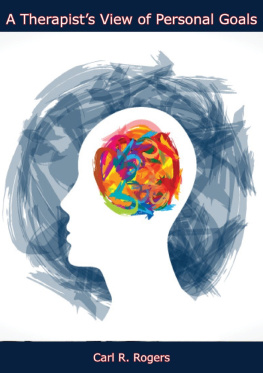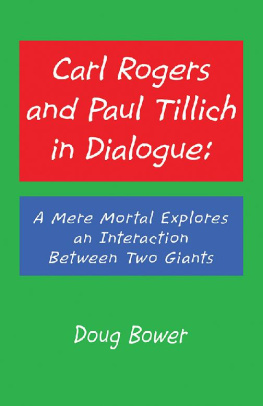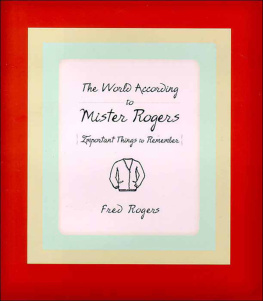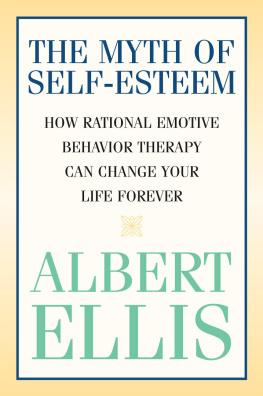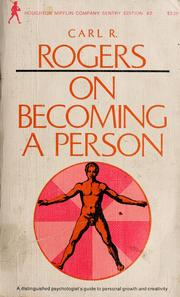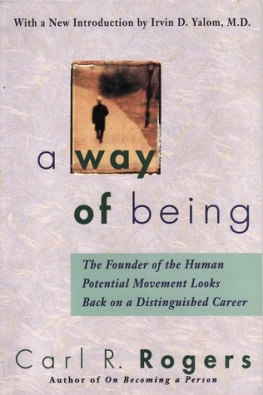

Barakaldo Books 2020, all rights reserved. No part of this publication may be reproduced, stored in a retrieval system or transmitted by any means, electrical, mechanical or otherwise without the written permission of the copyright holder.
Publishers Note
Although in most cases we have retained the Authors original spelling and grammar to authentically reproduce the work of the Author and the original intent of such material, some additional notes and clarifications have been added for the modern readers benefit.
We have also made every effort to include all maps and illustrations of the original edition the limitations of formatting do not allow of including larger maps, we will upload as many of these maps as possible.
A THERAPISTS VIEW OF PERSONAL GOALS
BY
CARL R. ROGERS
TABLE OF CONTENTS
Contents
The Questions
What is my goal in life? What am I striving for? What is my purpose? These are questions which every individual asks himself at one time or another, sometimes calmly and meditatively, sometimes in agonizing uncertainty or despair. They are old, old questions which have been asked and answered in every century of history. Yet they are also questions which every individual must ask and answer for himself, in his own way. They are questions which I, as a counselor, hear expressed in many differing ways as men and women in personal distress try to learn, or understand, or choose, the directions which their lives are taking.
In one sense there is nothing new which can be said about these questions. Indeed the quotation I have chosen for the title page of this pamphlet is taken from the writings of Kierkegaard who wrestled with these questions more than a century ago. Simply to express another personal opinion about this whole issue of goals and purposes would seem presumptuous. But as I have worked for many years with troubled and maladjusted individuals I believe that I can discern a pattern, a trend, a commonality, an orderliness, in the tentative answers to these questions which they have found for themselves. And so I would like to share with you my perception of what human beings appear to be striving for, when they are free to choose.
Some Answers
Before trying to take you into this world of my own experience with my clients, I would like to remind you that the questions I have mentioned are not pseudo-questions, nor have men in the past or at the present time agreed on the answers. When men in the past have asked themselves the purpose of life, some have answered, in the words of the catechism, that the chief end of man is to glorify God. Others have thought of lifes purpose as being the preparation of oneself for immortality. Others have settled on a much more earthy goalto enjoy and release and satisfy every sensual desire. Still othersand this applies to many todayregard the purpose of life as being to achieveto gain material possessions, status, knowledge, power. Some have made it their goal to give themselves completely and devotedly to a cause outside of themselves such as Christianity, or Communism. A Hitler has seen his goal as that of becoming the leader of a master race which would exercise power over all. In sharp contrast, many an Oriental has striven to eliminate all personal desires, to exercise the utmost of control over himself. I mention these widely ranging choices to indicate some of the very different aims men have lived for, to suggest that there are indeed many goals possible.
In a recent important study Charles Morris investigated objectively the pathways of life which were preferred by students in six different countriesIndia, China, Japan, the United States, Canada, and Norway. (5) As one might expect, he found decided differences in goals between these national groups. He also endeavored, through a factor analysis of his data, to determine the underlying dimensions of value which seemed to operate in the thousands of specific individual preferences. Without going into the details of his analysis, we might look at the five dimensions which emerged, and which, combined in various positive and negative ways, appeared to be responsible for the individual choices.
The first such value dimension involves a preference for a responsible, moral, self-restrained participation in life, appreciating and conserving what man has attained.
The second places stress upon delight in vigorous action for the overcoming of obstacles. It involves a confident initiation of change, either in resolving personal and social problems, or in overcoming obstacles in the natural world.
The third dimension stresses the value of a self-sufficient inner life with a rich and heightened self-awareness. Control over persons and things is rejected in favor of a deep and sympathetic insight into self and others.
The fourth underlying dimension values a receptivity to persons and to nature. Inspiration is seen as coming from a source outside the self, and the person lives and develops in devoted responsiveness to this source.
The fifth and final dimension stresses sensuous enjoyment, self-enjoyment. The simple pleasures of life, an abandonment to the moment, a relaxed openness to life, are valued.
This is a significant study, one of the first to measure objectively the answers given in different cultures to the question, What is the purpose of my life? It has added to our knowledge of the answers given. It has also helped to define some of the basic dimensions in terms of which the choice is made. As Morris says, speaking of these dimensions, it is as if persons in various cultures have in common five major tones in the musical scales on which they compose different melodies. (5, p. 185)
Another View
I find myself, however, vaguely dissatisfied with this study. None of the Ways to Live which Morris put before the students as possible choices, and none of the factor dimensions, seems to contain satisfactorily the goal of life which emerges in my experience with my clients. As I watch person after person struggle in his therapy hours to find a way of life for himself, there seems to be a general pattern emerging, which is not quite captured by any of Morris descriptions.
The best way I can state this aim of life, as I see it coming to light in my relationship with my clients, is to use the words of Soren Kierkegaardto be that self which one truly is. (3, p. 29) I am quite aware that this may sound so simple as to be absurd. To be what one is seems like a statement of obvious fact rather than a goal. What does it mean? What does it imply? I want to devote the remainder of my remarks to those issues. I will simply say at the outset that it seems to mean and imply some strange things. Out of my experience with my clients, and out of my own self-searching, I find myself arriving at views which would have been very foreign to me ten or fifteen years ago. So I trust you will look at these views with critical scepticism, and accept them only in so far as they ring true in your own experience.
DIRECTIONS TAKEN BY CLIENTS
Let me see if I can draw out and clarify some of the trends and tendencies which I see as I work with clients. In my relationship with these individuals my aim has been to provide a climate which contains as much of safety, of warmth, of empathic understanding, as I can genuinely find in myself to give. I have not found it satisfying or helpful to intervene in the clients experience with diagnostic or interpretative explanations, nor with suggestions and guidance. Hence the trends which I see appear to me to come from the client himself, rather than emanating from me.
Next page
